[et_pb_section admin_label=”section”][et_pb_row admin_label=”row”][et_pb_column type=”4_4″][et_pb_text admin_label=”Text” background_layout=”light” text_orientation=”left” text_line_height=”1.4em” use_border_color=”off” border_color=”#ffffff” border_style=”solid”]
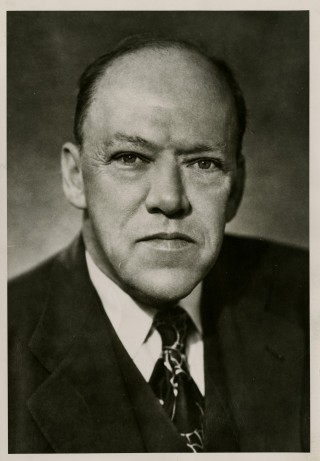
The Pulitzer Prize turns 100 years old this month. In 1939, John Gould Fletcher became the only Arkansan to win the prize for poetry and one of only a few from the state to ever earn the illustrious recognition for great achievements in literature and journalism.
Fletcher received the award for his 1938 book, Selected Poems. In that volume Fletcher brought together his works from throughout his career beginning in 1913. Many of the manuscript drafts of those poems, along with those from his later career, are preserved in Special Collections.
In recognition of Fletcher’s distinction as a Pulitzer winner, the department would like to share a few examples of Fletcher’s manuscripts, along with some of the other related resources in the University of Arkansas Libraries.
The John Gould Fletcher Papers (MS F63) came to the University of Arkansas Libraries soon after his death in 1950. His widow Charlie Mae Simon, a celebrated writer in her own right, donated the papers, as well as Fletcher’s extensive personal library. Simon also donated a smaller supplemental collection in the 1970s.
[/et_pb_text][et_pb_text admin_label=”Text” background_layout=”dark” text_orientation=”left” use_border_color=”off” border_color=”#ffffff” border_style=”solid” text_line_height=”1.4em” text_text_color=”#545454″]
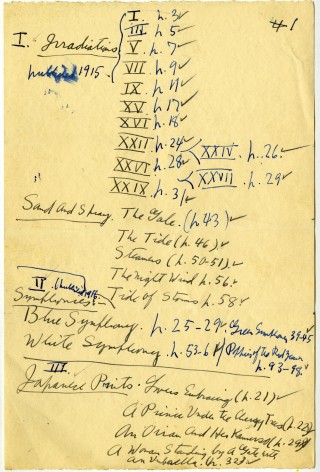
In total, the Fletcher Papers comprise more than 70 boxes of material containing literary manuscripts, notebooks, vast correspondence files, professional documentation from his varied enterprises and passions, and biographical material.
Fletcher’s book collection comprises an additional 1,700 volumes. There are numerous other collections that relate to Fletcher also in the Libraries, including the papers of close friends and colleagues such as Vance Randolph, artist Louis Freund, and fellow Arkansas poet Glen Ward Dresbach. You can see all the literary archives available in Special Collections with the topic guide for literary figures.
[/et_pb_text][et_pb_text admin_label=”Text” background_layout=”light” text_orientation=”left” use_border_color=”off” border_color=”#ffffff” border_style=”solid” text_line_height=”1.4em” text_text_color=”#666666″]
Born in Little Rock in 1886, Fletcher attended Harvard before withdrawing early in order to pursue a career as a writer. He traveled the world, living for extended periods in Italy, France, and England. Fletcher had a deep love of classical music, fine art, and Asian art and philosophy. His poetry and work outside of literary circles such as philanthropy reflected his wide ranging interests.
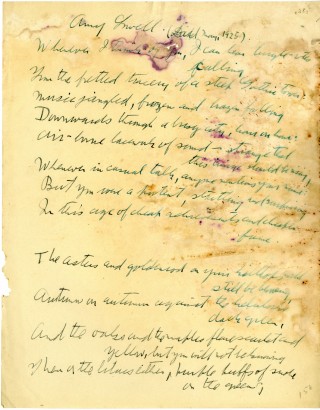
A contemporary of Ezra Pound and T.S. Elliot, Fletcher was a member of the Imagist movement of poets and critics have come to recognize him as one of the most innovative Modernists of the early 20th century. Pound and leading Imagist poet Amy Lowell were both influential on his early work, although he found himself at odds with their divergent approaches. After World War I, Fletcher’s writing became more concerned with social issues than other Modernists, and his major works were aligned with the Southern Agrarians, or “Fugitives.” While living in England Fletcher also met his first wife, Florence Emily Abruthnot. Their rocky marriage ended in divorce in the 1930s.
After several trips back to the states, and a rekindled interest in his home state, Fletcher returned to the US in 1933.
[/et_pb_text][et_pb_image admin_label=”Image” src=”https://librariesblog.uark.edu/wp-content/uploads/sites/81/2016/04/London_Nightfall_post.jpg” show_in_lightbox=”on” url_new_window=”off” use_overlay=”off” animation=”off” sticky=”off” align=”left” force_fullwidth=”off” always_center_on_mobile=”on” use_border_color=”off” border_color=”#ffffff” border_style=”solid”] [/et_pb_image][et_pb_text admin_label=”Text” background_layout=”light” text_orientation=”left” use_border_color=”off” border_color=”#ffffff” border_style=”solid” text_font_size=”13″ text_line_height=”1.6em”]
First draft and published version in Selected Poems of “London Nightfall” by John Gould Fletcher. Manuscript from John Gould Fletcher Papers (MS F63), box3, folder 30. Special Collections, University of Arkansas Libraries.
[/et_pb_text][et_pb_text admin_label=”Text” background_layout=”light” text_orientation=”left” use_border_color=”off” border_color=”#ffffff” border_style=”solid” text_line_height=”1.4em”]
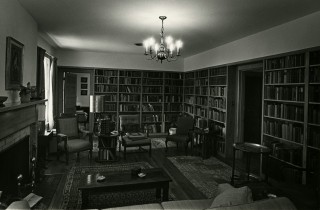
He and Simon married in 1936. A few years later they settled together in Little Rock and built Johnswood, their home overlooking the Arkansas River, in 1941. He would publish more than 20 volumes of poetry, a history of Arkansas, translations of poetry, edited collections, and many essays over more than 40 years as a writer and scholar.
The Fletcher library reflects his many lifelong scholarly interests including history, folk traditions around the world, Asian art and philosophy, and literary criticism. Alongside numerous early editions from renowned poets are several works published abroad in France and other countries. His library is remarkable for the number of chapbooks and other small volumes published for contests, critical reviews, and from small and artist presses, adding another dimension to its enduring importance for researchers.
[/et_pb_text][et_pb_image admin_label=”Image” src=”https://librariesblog.uark.edu/wp-content/uploads/sites/81/2016/04/Elegy_to_the_Dead.jpg” show_in_lightbox=”on” url_new_window=”off” use_overlay=”off” animation=”off” sticky=”off” align=”left” force_fullwidth=”off” always_center_on_mobile=”on” use_border_color=”off” border_color=”#ffffff” border_style=”solid”] [/et_pb_image][et_pb_text admin_label=”Text” background_layout=”light” text_orientation=”left” use_border_color=”off” border_color=”#ffffff” border_style=”solid” text_font_size=”13″ text_line_height=”1.6em”]
Manuscript for “Elegy for the Dead,” which reflects upon the human loss of World War I and later concludes “Part Six” of Selected Poems.John Gould Fletcher Papers (MS F63), box2, folder 16, Special Collections, University of Arkansas Libraries.
[/et_pb_text][et_pb_image admin_label=”Image” src=”https://librariesblog.uark.edu/wp-content/uploads/sites/81/2016/04/MS_F63_Elliot_to_Fletcher_Box46_F341_030628_contrast_post.jpg” show_in_lightbox=”on” url_new_window=”off” use_overlay=”off” animation=”off” sticky=”off” align=”left” force_fullwidth=”off” always_center_on_mobile=”on” use_border_color=”off” border_color=”#ffffff” border_style=”solid”] [/et_pb_image][et_pb_image admin_label=”Image” src=”https://librariesblog.uark.edu/wp-content/uploads/sites/81/2016/04/MS_F63_Elliot_to_Fletcher_Box46_F341_030628_p2_crop_post.jpg” show_in_lightbox=”on” url_new_window=”off” use_overlay=”off” animation=”off” sticky=”off” align=”left” force_fullwidth=”off” always_center_on_mobile=”on” use_border_color=”off” border_color=”#ffffff” border_style=”solid”] [/et_pb_image][et_pb_text admin_label=”Text” background_layout=”light” text_orientation=”left” use_border_color=”off” border_color=”#ffffff” border_style=”solid” text_line_height=”1.4em” text_font_size=”13″]
Letter to Fletcher from his friend and co-editor, T.S. Elliot, discussing their different skills and review approaches, March 6, 1928. John Gould Fletcher Papers (MS F63), box 46, folder 341.
[/et_pb_text][et_pb_text admin_label=”Text” background_layout=”light” text_orientation=”left” use_border_color=”off” border_color=”#ffffff” border_style=”solid” text_line_height=”1.4em”]
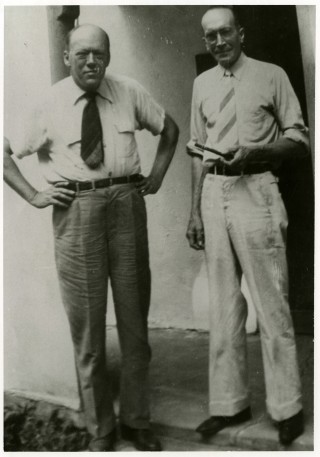
Some of the gems in his library include a first edition of the Edgar Lee Masters classic, Spoon River Anthology (1915); a limited, privately printed, and signed first edition of Lady Chatterley’s Lover by D.H. Lawrence (1928); an 1861 third edition of Whitman’s Leaves of Grass with the original embossed publisher’s cloth binding; and several T.S. Elliot first printings, such as A Song for Simeon (1928), which Elliot inscribed to Fletcher. To peruse the titles in Fletcher’s library (or through a search for them in the Catalog) is to walk through the inspirations and influences of a master writer’s lifelong enterprise.
You can also search through his notations in the index of marginalia available in Special Collections, along with detailed lists of his correspondence, and the two volume print finding aids.
[/et_pb_text][et_pb_text admin_label=”Text” background_layout=”light” text_orientation=”left” text_line_height=”1.4em” use_border_color=”off” border_color=”#ffffff” border_style=”solid”]
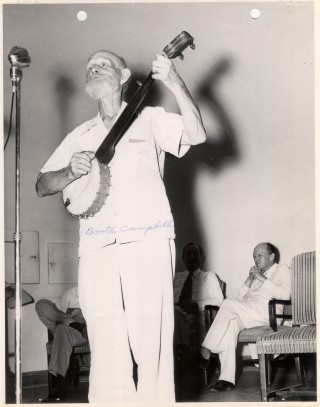
Although many inside and outside of the state are aware of Fletcher’s importance as a poet, less well known are the pivotal roles he played in organizing the earliest folklore societies and conferences in Arkansas, and how he helped energize a revival of historical research on his native state.
Fletcher was a supporter of countless cultural programs in Arkansas, especially in Little Rock, where he was a great friend of the Arkansas Symphony. Among the surprises in his papers in Special Collections is the first draft of the bylaws of the Arkansas Folklore Society. He would later influence faculty at the UofA in Fayetteville to begin collecting and teaching folklore, including Mary Celestia Parler, whose decades of recording and collecting work are now available through the Ozark Folksong Collection.
Fletcher’s friendship with folklorist Vance Randolph, as well as conductor of the Arkansas Symphony Laurence Powell, proved fortuitous for the discovery of celebrated folk singers and musicians, such as Emma Dusenbury. Fletcher even accompanied John Lomax on his first trip to Mena to record the blind and impoverished wellspring of generations of folk traditions there.
[/et_pb_text][et_pb_text admin_label=”Text” background_layout=”light” text_orientation=”left” use_border_color=”off” border_color=”#ffffff” border_style=”solid”]
Fletcher’s legacy as a supporter of Arkansas history and culture and as one of the state’s master poets continues to influence scholars and writers. Please note that publication and reproduction from the John Gould Fletcher Papers is subject to approval of the Head of Special Collections. Contact Special Collections to learn about accessing the collections of Fletcher and other remarkable writers and artists from Arkansas by emailing specoll@uark.edu or calling 479-575-8444.
[/et_pb_text][/et_pb_column][/et_pb_row][/et_pb_section]
